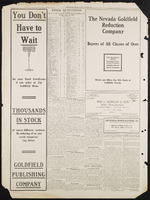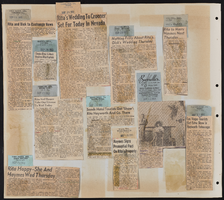Search the Special Collections and Archives Portal
Search Results
Gue Gim Wah Papers
Identifier
Abstract
The Gue Gim Wah Papers (approximately 1940-1985) consist primarily of incoming correspondence (largely written in Chinese) to Gue Gim Wah at the Prince Mine in Pioche, Nevada. Also included are Wah's naturalization certificate, a map of the Prince Mine Bunkhouse, brochure of the Lincoln County Civic Association, and a small amount of photographs including a black-and-white photograph of Gue Gim circa 1940s.
Archival Collection
Cherina Kleven Papers
Identifier
Abstract
The Cherina Kleven Papers (approximately 1988-2014) document the career of Cherina Kleven who was the first Asian-American appointed as Assistant Fire Chief for Las Vegas Fire & Rescue. The materials primarily include physical and digitized photographs of Kleven in her capacity as Assistant Fire Chief, magazine and newspaper articles featuring Kleven, and event programs. Also included are campaign fliers from 2010 when Kleven ran for office to represent Assembly District 15 in the Nevada Legislature as well as two commemorative books celebrating the history of Las Vegas Fire & Rescue.
Archival Collection
George Kelly Ryan Papers
Identifier
Abstract
The George Kelly Ryan papers (1921-1971) contain correspondence inquiring about Octavius Decatur "O. D." Gass, newspaper clippings from 1929, handwritten recollections of the Gold Ranch by Laura Royce, and a San Pedro, Los Angeles and Salt Lake Railroad Company information, including information on wash-outs in Nevada.
Archival Collection
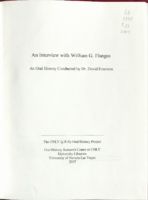
Transcript of interview with William G. Flangas by Dr. David Emerson, September 27, 2006
Date
Archival Collection
Description
Text
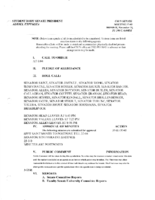
Meeting minutes for Consolidated Student Senate, University of Nevada, Las Vegas, November 13, 2006
Date
Archival Collection
Description
Text

Meeting minutes for Consolidated Student Senate University of Nevada, Las Vegas, Febuary 14, 1985
Date
Archival Collection
Description
Text
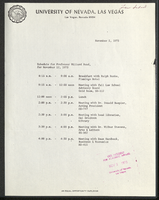
University of Nevada, Las Vegas law school planning: schedule, committee notes, correspondence, and reports
Date
Archival Collection
Description
Folder includes Citizens Ad Hoc Law School Committee notes by Janice S. Gould, "Final Report on Law Program (1967-68)", and correspondence and memos related to legal education at Nevada Southern University (later UNLV). From the University of Nevada, Las Vegas William S. Boyd School of Law Records (UA-00048).
Text

Zoe Albright oral history interview: transcript
Date
Archival Collection
Description
Oral history interview with Zoe Albright conducted by Barbara Tabach on October 16, 2018 for the Remembering 1 October Oral History Project. In this interview, Albright describes her work as a volunteer for the Red Cross and helping comfort those who came into the Metro Police Station after the 1 October shooting, searching for family and friends who were present at the Route 91 Harvest Festival. In addition to being a Red Cross volunteer, Albright is also a personal trainer, nutrition consultant and resident of Las Vegas since 1988.
Text

